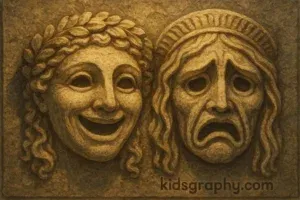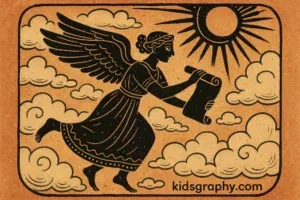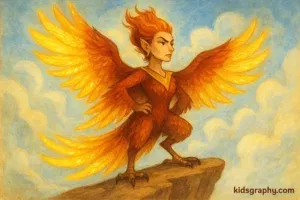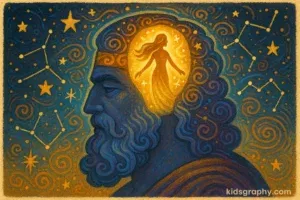In the quiet of the mountains, when you shout and hear your own voice reply, that’s an echo. But where did this mysterious repeating voice come from? The answer lies in a beautiful yet tragic story from Greek mythology, featuring a nymph named Echo whose voice lived on long after she was gone.
Her tale is one of love, loss, and a powerful curse that still echoes—literally—through forests and caves today.
Read More: Nyx in Greek Mythology: Goddess of the Night
Who Is Echo in Greek Mythology?
Echo was a mountain nymph, or Oread, in Greek mythology. She lived among the hills, valleys, and woods, always full of energy and talk. Known for her charming voice and endless chatter, Echo loved to speak, sing, and tell stories to anyone who would listen.
Her life was peaceful and free—until one day, her gift of speech turned into her greatest curse.
Read More: Calypso Greek Mythology: The Lonely Nymph
Echo’s Curse: A Punishment from Hera
The queen of the gods, Hera, grew jealous of her husband Zeus’s constant wandering and suspected him of visiting the nymphs. Echo, loyal to Zeus, distracted Hera with long conversations whenever he needed to sneak away.
When Hera discovered this trick, she was furious. As punishment, she cursed Echo to lose her voice—except for the ability to repeat the last words spoken to her.
From that moment on, Echo could no longer speak her thoughts. She could only mimic others, a cruel fate for someone who once loved to talk.
Read More: Ajax in Greek Mythology: Warrior of Honor and Tragedy
Echo and Narcissus: A Love That Couldn’t Speak
One day, Echo saw a handsome young man wandering the forest. His name was Narcissus, and he was known for his incredible beauty. Echo immediately fell in love.
She followed him, wanting to speak, to share her heart—but she could only repeat his words. When Narcissus heard her voice, he was confused and annoyed. He mocked her and pushed her away, not realizing her love or pain.
Heartbroken, Echo ran into the woods, hiding in caves and behind rocks. She wasted away, her body disappearing until only her voice remained.
Even today, when someone shouts in the mountains, people say Echo answers back, repeating the last word with her eternal voice.
Read More: Circe in Greek Mythology: The Witch of Aiaia
What Happened to Narcissus?
Narcissus’s fate was also tragic. After rejecting Echo and many others, he was cursed to fall in love with his own reflection. When he saw his face in a still pond, he couldn’t look away. He stayed there, gazing endlessly, until he withered and died.
From the spot where he died, a flower grew—the narcissus, a symbol of self-love and vanity.
Read More: Chaos in Greek Mythology: The First Being of Creation
The Meaning Behind Echo’s Myth
The myth of Echo reminds us of:
- The power of voice and how precious it is to express ourselves
- The pain of unreturned love
- The way silencing someone can erase their spirit, even if their presence lingers
Echo’s story is more than just the origin of a sound—it’s a lesson about communication, love, and loneliness.
Read More: Hera in Greek Mythology: Queen of the Gods
Echo in Literature and Culture
The story of Echo and Narcissus has been told for centuries:
- Roman poet Ovid shared it in his Metamorphoses
- Many artists and writers use Echo as a symbol of loss and longing
- In psychology, the term “echoism” refers to people who tend to put others’ needs ahead of their own—another link to her silent love
Her tale is still used today to talk about voice, identity, and fading away in silence.
Read More: Persephone in Greek Mythology: Queen of the Underworld
Echo and the Pain of Being Unheard
Echo’s story isn’t just about a curse—it’s about what happens when someone is robbed of their ability to communicate. She had so much to say, but could only repeat what others said. This turned her into a shadow of herself, unable to form relationships, share emotions, or even tell her own story.
In today’s world, Echo represents:
- People whose voices are ignored or silenced
- Those who feel unseen in love and friendship
- The pain of having no space to speak your truth
Her myth still resonates because it mirrors emotional loneliness that many feel—even when surrounded by others.
Read More: Titans in Greek Mythology: Gods Before Olympus
Echo’s Connection to the Natural World
As a nymph, Echo was deeply tied to nature. She lived in forests, caves, and mountains. Even after her body vanished, she remained in the land through sound. Her voice became part of nature itself—heard in cliffs, canyons, and wide valleys.
That’s why we hear our words come back to us in these places. It’s not just science; it’s mythology whispering back. It’s Echo, still listening, still answering.
Read More: Hephaestus: The Amazing Greek God of Fire and Forging!
Echo in Poetry and Modern Stories
Echo’s myth inspired poets and authors throughout time:
- Ovid’s version in Metamorphoses is the most famous. He described her tragic love for Narcissus in vivid detail.
- Romantic poets in the 1800s used Echo as a symbol of unspoken longing.
- In modern literature and films, characters like Echo appear when someone is silenced, ghosted, or forgotten.
She represents the echo of memory, the haunting presence of someone who once mattered but was left behind.
Echo’s Legacy: More Than Just a Sound
Echo’s name has become a universal symbol. It represents:
- A lingering presence
- A memory that repeats
- A cry for connection that never fully goes away
In science, we call repeating sound an echo. In life, we use the word to describe emotions that linger—like pain, regret, or love that wasn’t returned.
Her story has lived for thousands of years not just because of what happened to her, but because her voice—and her silence—still moves us.
More Stories: Echo in Greek Mythology
FAQ: Echo in Greek Mythology
People know Echo as a mountain nymph with a beautiful voice. Hera cursed her to repeat only the words of others.
Hera cursed Echo to only echo the last words spoken to her, taking away her ability to speak freely.
After Narcissus rejected her, Echo faded away in sadness until only her voice remained in the forests and mountains.
Echo fell in love with Narcissus, but he rejected her. Heartbroken, she disappeared. Narcissus later fell in love with his own reflection and died.
The word “echo” comes from the myth of Echo, whose voice repeated others. Her name is now used to describe reflected sound.
Read More: Athena in Greek Mythology: Goddess of Wisdom & War












